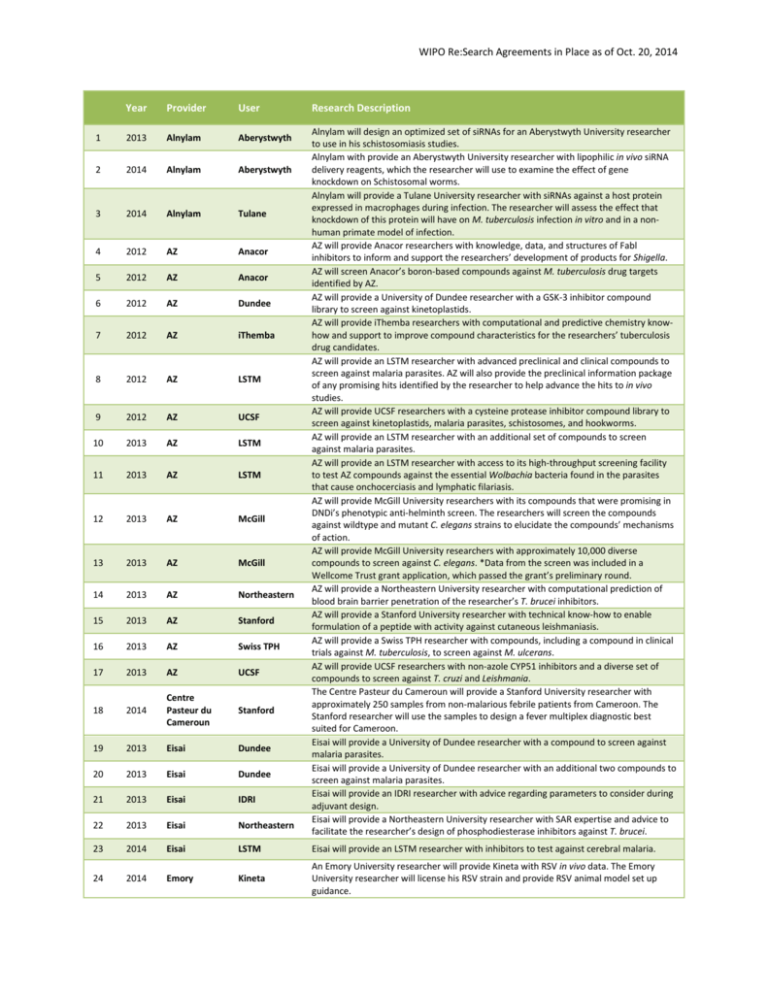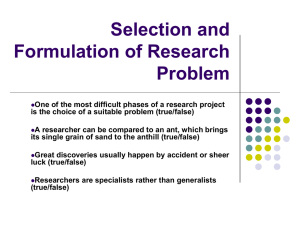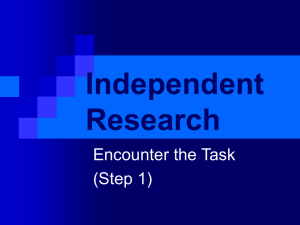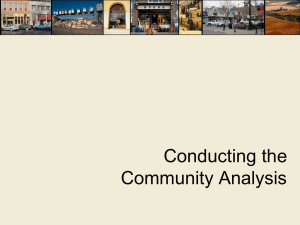WIPO Re:Search Agreements in Place as of Oct. 20, 2014
advertisement

WIPO Re:Search Agreements in Place as of Oct. 20, 2014 Year Provider User Research Description 1 2013 Alnylam Aberystwyth 2 2014 Alnylam Aberystwyth 3 2014 Alnylam Tulane 4 2012 AZ Anacor 5 2012 AZ Anacor 6 2012 AZ Dundee 7 2012 AZ iThemba 8 2012 AZ LSTM 9 2012 AZ UCSF 10 2013 AZ LSTM 11 2013 AZ LSTM 12 2013 AZ McGill 13 2013 AZ McGill 14 2013 AZ Northeastern 15 2013 AZ Stanford 16 2013 AZ Swiss TPH 17 2013 AZ UCSF 18 2014 Centre Pasteur du Cameroun Stanford 19 2013 Eisai Dundee 20 2013 Eisai Dundee 21 2013 Eisai IDRI 22 2013 Eisai Northeastern 23 2014 Eisai LSTM Eisai will provide an LSTM researcher with inhibitors to test against cerebral malaria. 24 2014 Emory Kineta An Emory University researcher will provide Kineta with RSV in vivo data. The Emory University researcher will license his RSV strain and provide RSV animal model set up guidance. Alnylam will design an optimized set of siRNAs for an Aberystwyth University researcher to use in his schistosomiasis studies. Alnylam with provide an Aberystwyth University researcher with lipophilic in vivo siRNA delivery reagents, which the researcher will use to examine the effect of gene knockdown on Schistosomal worms. Alnylam will provide a Tulane University researcher with siRNAs against a host protein expressed in macrophages during infection. The researcher will assess the effect that knockdown of this protein will have on M. tuberculosis infection in vitro and in a nonhuman primate model of infection. AZ will provide Anacor researchers with knowledge, data, and structures of Fabl inhibitors to inform and support the researchers’ development of products for Shigella. AZ will screen Anacor’s boron-based compounds against M. tuberculosis drug targets identified by AZ. AZ will provide a University of Dundee researcher with a GSK-3 inhibitor compound library to screen against kinetoplastids. AZ will provide iThemba researchers with computational and predictive chemistry knowhow and support to improve compound characteristics for the researchers’ tuberculosis drug candidates. AZ will provide an LSTM researcher with advanced preclinical and clinical compounds to screen against malaria parasites. AZ will also provide the preclinical information package of any promising hits identified by the researcher to help advance the hits to in vivo studies. AZ will provide UCSF researchers with a cysteine protease inhibitor compound library to screen against kinetoplastids, malaria parasites, schistosomes, and hookworms. AZ will provide an LSTM researcher with an additional set of compounds to screen against malaria parasites. AZ will provide an LSTM researcher with access to its high-throughput screening facility to test AZ compounds against the essential Wolbachia bacteria found in the parasites that cause onchocerciasis and lymphatic filariasis. AZ will provide McGill University researchers with its compounds that were promising in DNDi’s phenotypic anti-helminth screen. The researchers will screen the compounds against wildtype and mutant C. elegans strains to elucidate the compounds’ mechanisms of action. AZ will provide McGill University researchers with approximately 10,000 diverse compounds to screen against C. elegans. *Data from the screen was included in a Wellcome Trust grant application, which passed the grant’s preliminary round. AZ will provide a Northeastern University researcher with computational prediction of blood brain barrier penetration of the researcher’s T. brucei inhibitors. AZ will provide a Stanford University researcher with technical know-how to enable formulation of a peptide with activity against cutaneous leishmaniasis. AZ will provide a Swiss TPH researcher with compounds, including a compound in clinical trials against M. tuberculosis, to screen against M. ulcerans. AZ will provide UCSF researchers with non-azole CYP51 inhibitors and a diverse set of compounds to screen against T. cruzi and Leishmania. The Centre Pasteur du Cameroun will provide a Stanford University researcher with approximately 250 samples from non-malarious febrile patients from Cameroon. The Stanford researcher will use the samples to design a fever multiplex diagnostic best suited for Cameroon. Eisai will provide a University of Dundee researcher with a compound to screen against malaria parasites. Eisai will provide a University of Dundee researcher with an additional two compounds to screen against malaria parasites. Eisai will provide an IDRI researcher with advice regarding parameters to consider during adjuvant design. Eisai will provide a Northeastern University researcher with SAR expertise and advice to facilitate the researcher’s design of phosphodiesterase inhibitors against T. brucei. WIPO Re:Search Agreements in Place as of Oct. 20, 2014 25 2014 Emory, CDC Caltech 26 2013 Eskitis AZ 27 2014 Eskitis Swiss TPH 28 2012 GSK CWHM 29 2012 GSK UW 30 2012 GSK UW 31 2013 GSK NII 32 2013 GSK NII 33 2013 GSK UCSF 34 2013 GSK UCSF 35 2014 GSK IDRI 36 2014 GSK MIT 37 2014 GSK NII 38 2014 GSK Seattle BioMed 39 2013 IDRI SA MRC 40 2012 KCCR Stanford 41 2013 KCCR Northeastern 42 2013 KU Eisai 43 2014 KU Kineta 44 2014 McGill UBC 45 2014 McGill UBC 46 2012 MSD UCSF 47 2013 MSD Emory 48 2013 MSD UCSF 49 2012 NIH Emory 50 2013 NIH IDRI 51 2014 Northeastern CWHM 52 2014 Northeastern McGill 53 2014 Northeastern NII An Emory University researcher will provide a Caltech researcher with advice regarding the development of a polio diagnostic. A CDC researcher will provide information about primers to use for this diagnostic. The Eskitis Institute will provide AZ Bangalore researchers with samples from its Nature Bank to screen against M. tuberculosis. The Eskitis Institute will provide a Swiss TPH researcher with samples from its Nature Bank to screen against helminths and schistosomes. GSK will provide CWHM researchers with information, data, and insights into the development of MetAp-1 inhibitors for tuberculosis. GSK will work collaboratively with a UW researcher to identify the lead compound in a series, originally from the TCAMS. A UW researcher will provide GSK with confidential information and compounds. GSK will assess the compounds’ ability to block malaria parasite transmission. GSK will provide an NII researcher with kinase inhibitors to study various molecular pathways in blood-stage malaria parasites. GSK will provide an NII researcher with kinase inhibitors to study M. tuberculosis metabolic pathways. GSK will provide a UCSF researcher with a set of kinase inhibitors to screen against schistosomal worms. GSK will provide a UCSF researcher a second set of kinase inhibitors to screen against schistosomal worms. GSK will provide an IDRI researcher with protease inhibitors to screen against M. tuberculosis. GSK will provide an MIT researcher with compounds to assess a technical issue in a liverstage malaria model. If positive, an Open Lab may follow. GSK will provide an NII researcher with a set of kinase inhibitors to screen against liverstage malaria parasites. GSK will provide a Seattle BioMed researcher with a small collection of inhibitors to screen against T. brucei. IDRI will provide SA MRC and University of Cape Town researchers with expertise and advice to improve the solubility and bioavailability of the researchers’ anti-tuberculosis compounds. A KCCR researcher will provide Stanford University researchers with stool samples to support the researchers’ helminth diagnostic product development and testing. KCCR and Northeastern University researchers will explore grant opportunities together, develop exchange between students, and conduct collaborative lab projects. KU will provide Eisai researchers with expertise and ideas to address formulation challenges of Eisai’s anti-fungal compound. KU will develop formulations of Kineta’s dengue antiviral. A McGill University researcher will provide a UBC researcher with frozen cell extracts of Cryptosporidium infected cells. The UBC researcher will use these extracts to identify potential antigens for use in a vaccine. A McGill University researcher will provide a UBC researcher with frozen cell extracts of T. cruzi infected cells. The UBC researcher will use these extracts to identify potential antigens for use in a vaccine. MSD and a UCSF researcher signed a confidentiality agreement to enable discussions regarding compound selection for schistosomiasis screens. MSD will provide an Emory University researcher studying tuberculosis with membranebound protein purification expertise. MSD will provide a UCSF researcher with HMGCoA-reductase inhibitors (statins) to screen against schistosomal worms. The NIH will provide an Emory researcher with biology expertise and support foran RNAdependent RNA polymerase inhibitor of dengue and Rift Valley Fever viruses. The NIH will provide IDRI researchers with natural product extracts to screen against M. tuberculosis. A Northeastern University researcher will share the structures of a class of inhibitors with CWHM researchers. The CWHM researchers will perform virtual docking to determine whether these inhibitors could be promising against M. tuberculosis. A Northeastern University researcher will synthesize an inhibitor previously demonstrated by a McGill researcher to inhibit malaria parasites. The McGill researcher will utilize the compound to repeat his in vivo screens. A Northeastern University researcher will provide an NII researcher with siRNAs to assess WIPO Re:Search Agreements in Place as of Oct. 20, 2014 54 2013 Novartis McMaster 55 2012 PATH KCCR 56 2014 PATH Caltech 57 2014 PATH U. of Calgary 58 2013 Pfizer 60P 59 2013 Pfizer CWHM 60 2013 Pfizer McGill 61 2013 Pfizer PATH 62 2014 Pfizer 60P 63 2014 Pfizer PATH, UVM 64 2013 Sanofi CWHM 65 2014 Stanford Caltech 66 2013 U of Lagos Stanford 67 2014 U of Lagos NIPD 68 2014 U of Lagos Novartis 69 2014 U of Lagos Stanford 70 2014 U of Mauritius Northeastern, Emory 71 2014 UBC McGill 72 2014 UBC Swiss TPH 73 2014 UBC U of Ibadan 74 2014 UCSF LSTM 75 2014 UCSF NIH 76 2014 UCSF Stanford 77 2014 USF McMaster regulation of host hepatocyte genes during liver-stage malaria. The Northeastern University researcher will also provide nanoparticle-encapsulated small molecules for targeted delivery to hepatocytes. Novartis will provide a McMaster University researcher with a polyclonal anti-dengue antibody. PATH and a KCCR researcher will discuss and plan the co-development of a novel onchocerciasis diagnostic. PATH will provide a Caltech researcher with expertise, publications, and information to facilitate the development of a tuberculosis diagnostic. PATH will provide a University of Calgary researcher with its temperature control system for isothermal amplification to apply to the researcher’s LAMP-based malaria diagnostic. Pfizer will provide 60P with its investigator’s brochure for a discontinued compound. 60P is hoping to repurpose the drug as a dengue treatment. Pfizer will provide CWHM researchers with two compounds to evaluate in a rat diarrhea model. Pfizer will provide a McGill University researcher with a JAK inhibitor to screen in a cerebral malaria model. Pfizer will provide PATH with a drug’s investigator’s brochure, summary table of the drug’s clinical trials, and drug + cholera toxin study information. PATH aims to repurpose the drug to treat diarrheal diseases. Pfizer will provide 60P with a drug’s exploratory data plan and degradation studies data. 60P will utilize this data to repurpose Pfizer’s drug for dengue fever. Pfizer will provide PATH and a UVM researcher with an inhibitor to test in an animal model of diarrhea. Sanofi will provide CWHM researchers with two compounds to evaluate in a rat diarrhea model. A Stanford University researcher will provide a Caltech researcher with DNA and primers to test in a microfluidics instrument. A University of Lagos researcher will host two Stanford University researchers in order to test their paper microscope on field samples. A University of Lagos researcher will collaborate with an NIPD researcher to identify resistance to anti-malarial drugs using dry blood spots from Nigerian malaria patients treated with anti-malarials. The NIPD researcher will host a University of Lagos PhD student for two months. During this time, they will utilize the dried blood to monitor drug resistance markers in the malaria parasites contained within the samples. A University of Lagos researcher will provide Novartis with dry blood spots from malaria patients. Novartis will assess the feasibility of using dried blood spot sampling (DBSS) and next generation sequencing of Plasmodium falciparum in malaria patients in Nigeria. A University of Lagos researcher will provide a Stanford University researcher with plasma and whole blood samples to compare efficacy of a malaria diagnostic. The Stanford University researcher will host a University of Lagos PhD student for 2-3 months. A University of Mauritius researcher will provide an Emory University researcher with polymeric micelles to assess tuberculosis drug delivery, uptake, and efficacy in the presence of the micelles. A Northeastern University researcher will alter the micelles to target them to the macrophage. A UBC researcher will utilize his phage-display technology to identify single-chain antibodies that can be used in a McGill University researcher’s host-based biomarker Chagas diagnostic. A UBC researcher will provide a Swiss TPH researcher with avermectins that were promising against M. tuberculosis to screen against M. ulcerans A UBC researcher will elucidate the structures of ~10 natural products previously demonstrated by a University of Ibadan researcher to have anti-malarial or antituberculosis activities. A LSTM researcher will provide a UCSF researcher with stool and plasma samples from Trichuris-infected children from Ecuador. The UCSF researcher will compare the amount of specific factors present in infected vs. uninfected samples. A UCSF researcher will provide an NIH researcher with a cysteine protease inhibitor that showed promise against schistosomes. The NIH researcher will screen the inhibitor against Taenia cysticerci – the causative agent of neurocysticercosis. A UCSF researcher will test a Stanford University researcher’s peptides against Leishmania parasites in vitro to determine the peptides’ EC50s. Promising peptides will be selected for an electron microscopy assay. A McMaster University researcher will develop a filtration device capable of WIPO Re:Search Agreements in Place as of Oct. 20, 2014 78 2014 UBC U of Buea 79 2014 NIPD U of Ibadan 80 2014 Aberystwyth U of Buea 81 2014 Emory WRAIR concentrating particulates from environmental samples. Once completed, a USF researcher will assess the device’s ability to concentrate Ascaris eggs from soil and sewage samples. A UBC researcher will perform activity-guided fractionation on natural product extracts previously demonstrated by a University of Buea researcher to have anti-onchocercal activities. A NIPD researcher will provide a University of Ibadan researcher with a lateral flow dipstick diagnostic for schistosomiasis. The Ibadan researcher will assess the ability of the diagnostic, which was developed to diagnose S. japonicum infections, to diagnose S. mansoni infections. An Aberystwyth University researcher will provide a University of Buea researcher with inhibitors that had previously been shown to be active against Fasciola. The University of Buea researcher will screen these inhibitors against Onchocerca microfilariae and macrofilariae. An Emory University researcher will measure the plasmablast response induced by WRAIR’s dengue vaccine.







